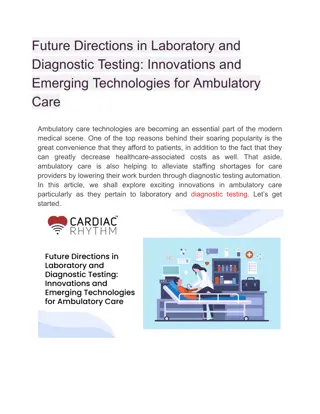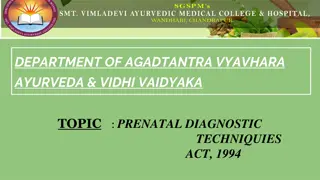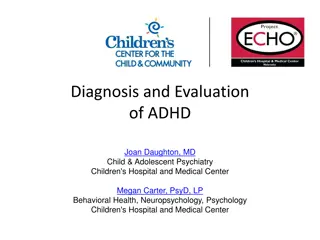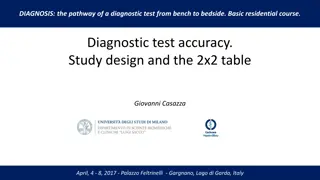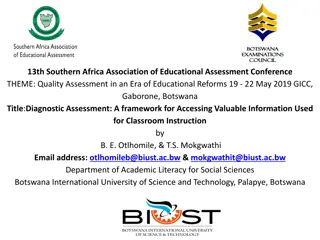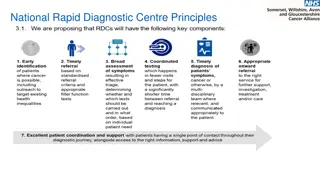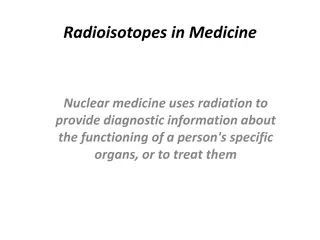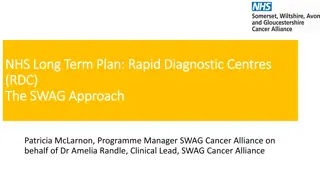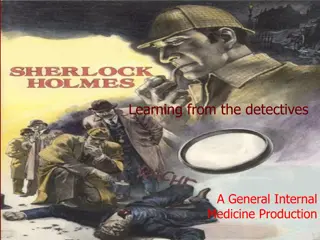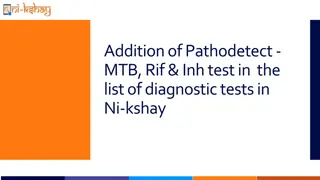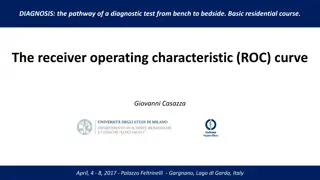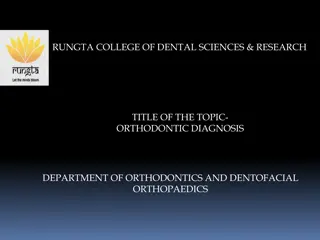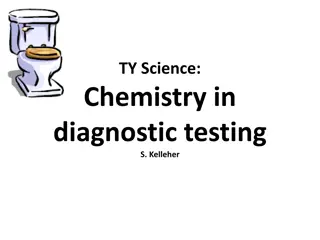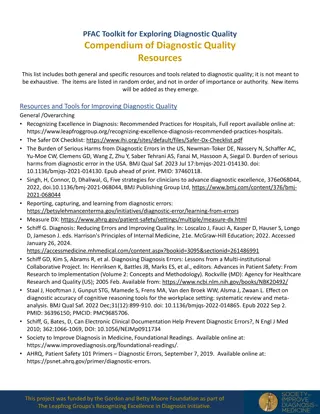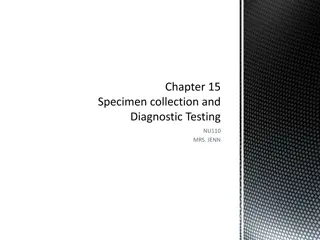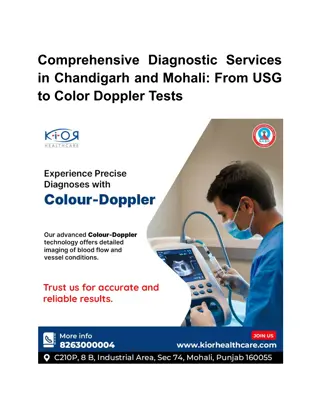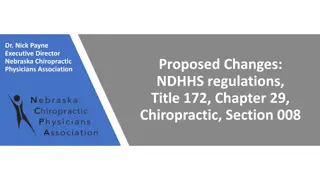Actions Emanating from the Evaluation of the Governance Reform
The evaluation of the governance reform within the WMO aimed to assess its alignment with strategic objectives, effectiveness in responding to societal needs, coordination efficiency, decision-making process, agility, and more. Evaluation criteria included relevance, design validity, effectiveness,
1 views • 13 slides
Understanding Diagnostic Test Evaluation and Performance
Explore the intricacies of evaluating diagnostic tests, including precision, sensitivity, specificity, and factors influencing test performance. Learn about the purpose of diagnostic tests, examples across various fields, and the types of studies used to assess them.
9 views • 53 slides
Future Directions in Laboratory and Diagnostic Testing_ Innovations and Emerging Technologies for Ambulatory Care
Ambulatory care technologies are becoming an essential part of the modern medical scene. One of the top reasons behind their soaring popularity is the great convenience that they afford to patients, in addition to the fact that they can greatly decrease healthcare-associated costs as well. That asid
12 views • 5 slides
Understanding the Prenatal Diagnostics Techniques Act of 1994 in India
The Prenatal Diagnostic Techniques Act of 1994 in India aims to curb female foeticide and address the dwindling sex ratio by prohibiting prenatal sex determination. This legislation regulates diagnostic methods, prevents sex selection, and focuses on detecting genetic disorders, metabolic abnormalit
0 views • 15 slides
Comprehensive School Quality Assurance and Evaluation Process
A detailed insight into the Quality Assurance Department's role in school evaluation and improvement processes, including Whole School Evaluation (WSE), Follow-through initiatives, Teaching and Learning assessments, Resumption and Examination Monitoring. The process involves both internal self-evalu
0 views • 20 slides
Methods of Training Evaluation: Overview and Importance
Training and development are fast-growing fields globally, including in India. Evaluation plays a crucial role in understanding the effectiveness and efficiency of training programs for human resource development. This presentation covers the concept of training, evaluation strategies, methods/model
0 views • 61 slides
Universal Evaluation Framework: Simplifying Evaluation Processes
This session introduces the Universal Evaluation Framework (UEF) developed for evaluating QAA Scotland Enhancement Themes. Participants learn key evaluation questions, evidence capture, and the Theory of Change to enhance evaluation confidence. The QAA Scotland Evaluation Odyssey details historical
2 views • 14 slides
Understanding ADHD Diagnosis and Evaluation in Children and Adolescents
This resource provides valuable insights into the diagnosis and evaluation of ADHD in children and adolescents. It covers important diagnostic aspects, criteria from DSM-5 for inattention and hyperactivity-impulsivity, and outlines when to make a referral for a formal evaluation. The content sheds l
1 views • 18 slides
Implementing Blind Evaluation Pilot in HORIZON EUROPE: Key Facts and Process
HORIZON EUROPE is conducting a pilot on Blind Evaluation in the 2023-2024 work program to address biases in the research and innovation evaluation process. The pilot aims to assess the feasibility of blind evaluations in ensuring fairness and mitigating potential biases towards well-known organizati
9 views • 9 slides
Strengthening National Evaluation Capacity in the Era of Sustainable Development Goals
The presentation by Vijayalakshmi Vadivelu at the National Evaluation Capacities Conference 2017 in Istanbul focused on the importance of strengthening national evaluation capacity in alignment with the Sustainable Development Goals (SDGs). The content covers the holistic approach to national evalua
3 views • 18 slides
Exploring Developmental Evaluation for Better Decision-Making
Delve into the realm of developmental evaluation, focusing on its purpose, principles, and application in practice. Understand how developmental evaluation emphasizes real-time data collection for informed decision-making in complex systems. Learn about key principles such as developmental purpose,
0 views • 25 slides
Evaluation Practices in Macedonia: What Works, What Doesn't
The comparison between the effectiveness of evaluation practices and the presence of formal institutions in Macedonia raises questions about the impact of institutional design on outcomes. While some countries with robust evaluation institutions fall short in practice, others lacking such structures
1 views • 7 slides
Enhancing Evaluation Capabilities in Mongolia for Agenda 2030
The Mongolian Evaluation Network in collaboration with UNDP is working to integrate the 2030 Agenda into national strategies and plans, establish institutional coordination mechanisms, align budgets, and enhance data monitoring systems. Key stakeholders including government agencies, NGOs, and inter
0 views • 9 slides
Understanding Demi-Regularity in Realist Evaluation
Realist Evaluation is a theory-driven approach focusing on understanding the context and mechanisms of action behind policies and interventions. This webinar explores the concept of demi-regularity in realist evaluation, its origins, and its application in analyzing complex evidence. Key aspects cov
1 views • 16 slides
Understanding Evaluation in Education
Evaluation in education is a comprehensive term that encompasses measurement, testing, and qualitative examination of student behavior. It involves both quantitative and qualitative descriptions, along with value judgments. Differentiating from mere measurement, evaluation provides a deeper analysis
0 views • 28 slides
Diagnostic Test Accuracy Study: Design and Implementation
This content delves into the pathway of a diagnostic test from development to clinical application, focusing on the basic concepts of diagnostic test accuracy, study design, the 2x2 table, and key terminology. It discusses the importance of study design in assessing diagnostic accuracy, including fa
0 views • 16 slides
Enhancing Educational Assessment Through Diagnostic Techniques
Diagnostic Assessment (DA) is a valuable technique that provides detailed information about students' knowledge and skills, supporting teachers in identifying strengths and weaknesses for tailored instruction. This approach offers a more nuanced understanding than traditional assessments, contributi
0 views • 20 slides
Sustainable Evaluation Systems Workshop Summary
Workshop on Sustainable Evaluation Systems by Stephen Porter at the NEC Conference focused on defining evaluation systems, addressing their failures, and emphasizing the importance of quality, use, and networks in achieving sustainability. Participants engaged in activities such as bingo card introd
0 views • 38 slides
Strategic Management: Strategy Review and Evaluation
This chapter delves into the critical process of strategy review, evaluation, and control in strategic management. It covers the nature of strategy evaluation, effective evaluation systems, contingency planning, auditing, using computers for evaluation, and guidelines for effective strategic managem
1 views • 42 slides
Prostate Rapid Diagnostic Service Transformation Overview
The document outlines the transformation of the Prostate Rapid Diagnostic Service (RDS), detailing plans, due diligence requirements, implementation timelines, and good practices such as virtual telephone triage systems and use of MRI before biopsies. It emphasizes the implementation of Rapid Diagno
4 views • 8 slides
Diagnostic Specialty Antibodies Market, Diagnostic Antibody, Infectious Disease
Diagnostic Specialty Antibodies Market by Type (Primary, Secondary), Clonality (Monoclonal, Polyclonal), Technique (WB, Rapid Test, IHC, IP), Conjugate, and Application (Dengue, Malaria, Hepatitis, HIV, E. coli , Tuberculosis, Pneumonia, Cancer)- For
0 views • 3 slides
Applications of Radioisotopes in Nuclear Medicine
Nuclear medicine utilizes radioisotopes to provide crucial diagnostic information about the functioning of specific organs and to treat various conditions. Diagnostic techniques in nuclear medicine involve using radioactive tracers that emit gamma rays from within the body. Positron Emission Tomogra
0 views • 19 slides
SWAG Cancer Alliance Rapid Diagnostic Services Implementation Plan
The SWAG Cancer Alliance aims to develop Rapid Diagnostic Services for patients with non-specific symptoms within Primary Care Networks. By 2028, the goal is to diagnose 75% of cancers at Stage 1 & 2, emphasizing personalized, timely diagnoses integrated with existing diagnostic provision. The appro
0 views • 8 slides
Learning from Fictional Detectives for Better Diagnostic Skills
Explore the application of lessons from fictional detectives like Sherlock Holmes to enhance diagnostic processes in medicine. Delve into problem representation, observation, deduction, and clinical reasoning strategies to improve diagnostic accuracy and patient care.
0 views • 68 slides
Impact and Evaluation Toolkit for Churches and Christian Charities
This toolkit aims to equip churches and Christian charities engaged in small-scale social action projects to think about impact, measure impact, choose data tools, reflect on evaluation data, and use it effectively. It covers principles of evaluation, setting objectives, selecting indicators, storyt
0 views • 34 slides
Overview of Monitoring and Evaluation in the GEF
The Evaluation in the GEF and Training Module focuses on promoting accountability and learning within the Global Environment Facility (GEF) through monitoring and evaluation activities. The GEF Independent Evaluation Office plays a crucial role in assessing results, effectiveness, and performance of
0 views • 25 slides
Developing an Evaluation Work Plan for Effective Program Assessment
This presentation by Amy D. Andrade from San Jose State University focuses on developing an Evaluation Work Plan to identify responsibilities and timelines. It covers topics such as Evaluation Coaching Support, Webinar Outlines, Logic Model, Inputs-Outputs-Outcomes, Two Approaches to Evaluation, Pro
0 views • 29 slides
Enhancing Diagnostic Tests with Pathodetect in Ni-kshay Module
A new test type, Pathodetect-MTB, Rif & Inh, has been introduced for tuberculosis diagnosis in Pathodetect laboratories. This test has been added to the diagnostic tests list in the Ni-kshay module, enabling seamless reporting in TB diagnostic facilities. The process of adding this test, including s
0 views • 10 slides
Understanding Diagnostic Test Accuracy: A Practical Overview
Navigate through the pathway of diagnostic test development, implementation, and evaluation from bench to bedside. Explore the Receiver Operating Characteristic (ROC) curve, the impact of cut-off variations on sensitivity and specificity, and the practical application of continuous measurement in di
0 views • 32 slides
Evaluation Synthesis in Changing Contexts: Enhancing Knowledge for Development Effectiveness
Evaluation synthesis is crucial for promoting learning, reflection, and decision-making in development work. This process involves bringing together diverse knowledge sources to generate strategic insights and facilitate wider use of evaluation findings. The Independent Office of Evaluation of IFAD
0 views • 20 slides
Evaluation of FME Zero Emission Neighbourhoods in Smart Cities
The mid-term evaluation process of FME Zero Emission Neighbourhoods in Smart Cities involves self-evaluation, partner evaluation, and panel evaluation. The procedure includes scientific review, evaluation by scholars, and innovation assessment. Key documents like self-reports, progress reports, and
1 views • 20 slides
Overview of Regular Evaluation 2017 Findings in Estonia
In the Regular Evaluation 2017, efforts were made to maximize the benefits of evaluation outcomes for various stakeholders in Estonia such as the state, society, and institutions. The evaluation focused on a range of actions including preparing legislation, finding experts, creating self-report form
0 views • 6 slides
Diagnostic Approaches in Hematologic Disorders: A Comprehensive Overview
Explore the diagnostic considerations for multiple myeloma, monoclonal gammopathy of undetermined significance (MGUS), and related conditions, including indications for serum protein electrophoresis (SPEP) and free light chain (FLC) testing. Learn when not to order SPEP and FLC, and consider various
0 views • 24 slides
Comprehensive Guide to Training Evaluation Methods
This detailed guide covers the aim of evaluation, evaluation methods, techniques of evaluation, types of evaluation (formative, process, outcome, impact), and the significance of formative and process evaluation in assessing training effectiveness. Learn about the key principles and practices involv
0 views • 45 slides
Orthodontic Diagnosis: Essential Tools and Techniques
This detailed guide covers essential diagnostic aids for orthodontic diagnosis, including case history, general examination, intraoral examination, supplemental diagnostic aids, orthodontic study models, diagnostic setups, facial photographs, electromyography, radiographs, recent advances, and more.
0 views • 39 slides
Utilizing Different Samples for Diagnostic Testing in Medicine
The practice of diagnostic testing in medicine goes beyond blood and stool samples. Gathering urine samples, for example, allows healthcare providers to assess various health aspects, such as kidney function, urinary tract infections, diabetes, and more. By examining the color, clarity, odor, densit
0 views • 21 slides
Toolkit for Exploring Diagnostic Quality Resources
A compendium of resources and tools for improving diagnostic quality, covering general and specific aspects. It includes recommendations for hospitals, checklists, research on diagnostic errors, strategies for clinicians, cognitive reasoning tools, readings on diagnostic errors, and more. The list i
0 views • 5 slides
Guidelines for Safe and Efficient Diagnostic Testing Procedures
This content provides detailed guidelines and procedures for specimen collection and diagnostic testing in healthcare settings, covering aspects such as patient assessment, specimen labeling, completing diagnostic requisition forms, and specific procedures like amniocentesis, arteriography, barium e
0 views • 21 slides
Comprehensive Diagnostic Services in Chandigarh and Mohali_ From USG to Color Doppler Tests
In modern healthcare, diagnostic services are essential for early detection, monitoring, and effective treatment of various health conditions. For residents of Chandigarh and Mohali, access to high-quality diagnostic facilities has never been easier.
1 views • 4 slides
Impact of Court Decision on Chiropractic Diagnostic Testing Regulations
The court case of Yagodinski v. Sutton in Nebraska involving expert testimony on traumatic brain injuries by chiropractors has raised questions about the scope of diagnostic testing allowed for chiropractic care. The court ruled that specialized tests used by chiropractors may not be admissible in c
0 views • 8 slides


